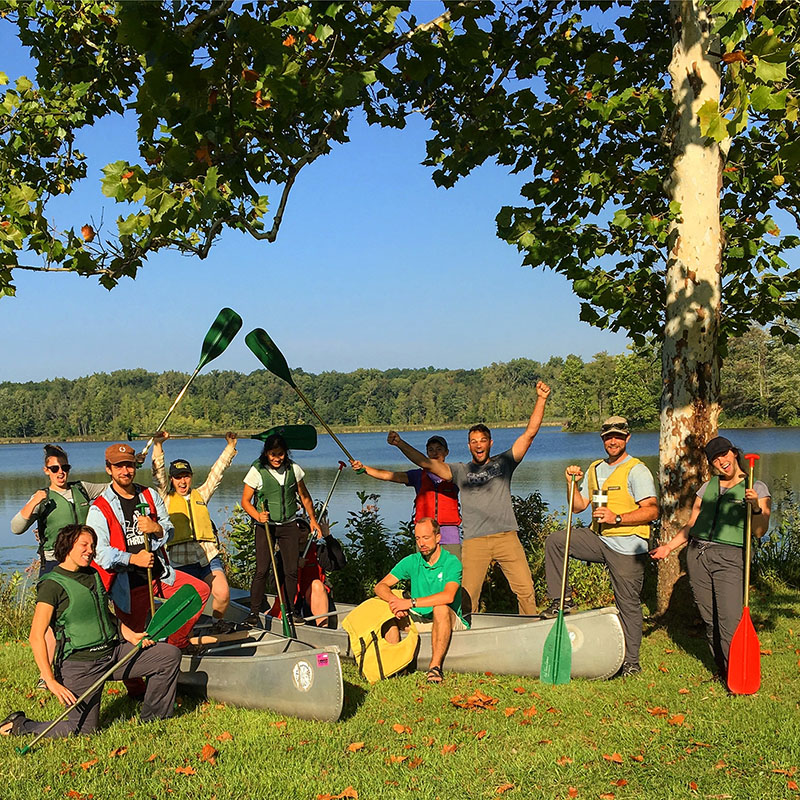The last time Skye McKinnell, a senior environmental science major, spent a fall semester on campus was two years ago, in 2016. Back then, McKinnell lived in Goshen College’s Yoder residence hall. Since then, she’s spent a fall semester in China’s Sichuan province on SST, and now she’s at GC’s Merry Lea Environmental Learning Center as part of the college’s Sustainability Leadership Semester (SLS).
SLS is a 15 credit, semester-long study of practical sustainable practices for people for whom doing is believing.“I think that SLS is really good for people that have to see something for it to be real, so more hands on people, because instead of reading about phenomenons in books, you’re putting your hands in the dirt,” said McKinnell.
In total, six students are taking part in SLS this semester. Four of the students—McKinnell, Mandira Panta, Rheannon Starr and Lydia Dyck — are from Goshen College. Joining the GC students are two students from Elkhart’s Anabaptist Mennonite Biblical Seminary (AMBS).
And although SLS is an integral part of the sustainability major and minor, anyone can, and is encouraged to, apply.
“We have had art; film; peace, justice and conflict studies; sustainability studies, environmental science, biology, interdisc and American Sign Language interpreting majors in the SLS,” said Joel Pontius, director of SLS.
GC’s sustainability and biology majors are grateful for the opportunity the AMBS students provide.
“Sustainability is such a mixture of things like science and art and religion. Having these different perspectives allows us all to question the thoroughness of our understanding with regards to what it means to live sustainably,” said McKinnell.
Following the students’ initial orientation, the group of six took to their canoes for an eight-day trip from Merry Lea to Lake Michigan to understand the local watershed.
“We were made to understand how the actions we take toward our waters affect people and places all along the way to Lake Michigan,” said McKinnell.
Pontius shared that the canoe trip has been his favorite field trip.
“Some of my favorite moments were the morning poetry readings we did along the banks of the river before we launched canoes for the day,” he said. “The readings allowed us to look at the river and everything around it in a deeper way, taking in the water’s movement and all the sounds around us.”
The eight-day trip happens only once, but for SLS students, every single Wednesday means a trip out into the community to both observe and engage in sustainable ways. Pontius believes these trips to be transformative for the students.
When they’re not observing local sustainable farms or venturing out to the great lakes, the SLS students take a series of intensive, month-long classes. Each month consists of two courses ranging in topic from Freshwater Resources to Environmental Policy and Politics.
An average week for an SLS student consists of daily two hour sessions for each class in addition to weekly three hour labs for each class. Four faculty members — Pontius, Jonathon Schramm, Dave Ostergren and Tom Hartzel — combine to teach SLS’s courses.
“The profs are super cool and listen to us,” said McKinnell. “We told a prof that we were really into the idea of foraging for wild fruits, so Tom [Hartzell] took us out on the property to gather fruit for juice.”
On top of their classes, SLS students each take on a semester long sustainability project. For example, McKinnell is working with the local lakes council to acquire grants to test and remove invasive species. These projects provide an opportunity to engage with the local ecosystem in meaningful ways and to hopefully cause real positive change.
Thankfully, McKinnell said that the SLS schedule leaves plenty of time for relaxing outdoors and taking advantage of Merry Lea’s 1,189 acres of land and eight miles of hiking trails.
“My favorite part is waking up every morning and looking out the window and seeing the trees,” she said. “Hiking to class instead of walking to class is like the best thing on planet earth.”
Both McKinnell and Pontius love the intimate community formed between the students and faculty at Merry Lea.
“The students plan and shop for meals together—this year’s cohort has found probably half of their food by dumpster diving—and cook and eat as a community daily,” said Pontius. He added that faculty and students also share meals at least a few times per week.
Ultimately, the hope with SLS is to provide students with the knowledge of what it means to live sustainably and the confidence to inspire others to do the same.
“Students spend a good amount of time, through interactive courses and experiences, unpacking their personal values, commitments, strengths and leadership styles,” said Pontius.
In the end, students come out of SLS with an idea of not only how to live sustainable lives themselves, but also how to show others how enjoyable and rewarding such a life can be.



